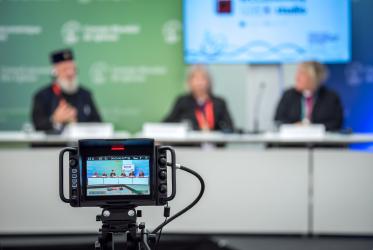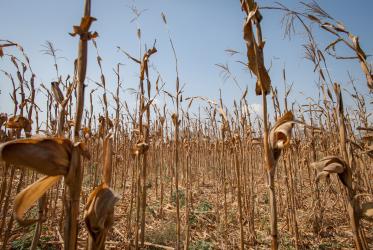<typolist>
Affirm our commitment to care for the earth as our response to God's love for creation;
Declare as forcefully as we can the urgency of the threat of human-induced climate change to the lives, livelihoods, societies, cultures and eco-systems of the Pacific Islands;
Dedicate ourselves to engaging our churches in education and action on climate change;
Commit ourselves to ecumenical collaboration among our churches and with other religious and secular bodies in the Pacific and beyond that will increase the effectiveness of our national and regional efforts;
Call on our sisters and brothers in Christ throughout the world to act in solidarity with us to reduce the causes of human-induced climate change. We issue this call particularly to churches in the highly-industrialized nations whose societies are historically responsible for the majority of polluting emissions. We further urge these countries to take responsibility for the ecological damage that they have caused by paying for the costs of adaptation to the impacts that can be anticipated;
Invite church-related specialized ministries for emergency-response, development and advocacy to integrate climate change and adaptation projects into their policy-development, education and advocacy;
Express appreciation to the World Council of Churches for its support of the Pacific churches on the issue of climate change and request that the voices of the Pacific become increasingly reflected in the WCC Climate Change Programme and in the next WCC Assembly in 2006;
Pressure all countries to ratify and implement the Kyoto Protocol, especially highly-industrialized nations such as the United Sates of America, Australia and the Russian Federation which to date have not ratified the Protocol ;? Encourage companies that are major producers or consumers of fossil fuels to support a transition toward less carbon-intensive economies, reduced energy usage and the development of cleaner, renewable energy sources.
</typolist>
We are appreciative of the increasing collaboration over the past several years between the WCC's Justice, Peace and Creation Cluster and ecumenical relief and development agencies related to the impact of climate change and on issues related to water. This cooperation resulted in a joint statement endorsed by many WCC member churches and ecumenical relief and development agencies in 2002 entitled "A Call to Action in Solidarity with Those Most Affected by Climate Change". A series of consultations cosponsored by the WCC and ecumenical relief and development agencies have been held with the most recent one being in October 2004 in the Netherlands on "Climate and Water: Common Gifts, Related Threats". At the October 2004 gathering, a series of proposals were adopted for expressing the support and solidarity of the WCC and agencies for vulnerable peoples and ecosystems as well as a statement entitled "Moving Beyond Kyoto with Equity, Justice and Solidarity" on the need for inter-governmental negotiations on a post-Kyoto climate framework.
Proposed Action:
The Central Committee of the World Council of Churches is invited to receive with appreciation the call of the Pacific Churches recommendations on Climate Change.
Relevant Documents
The following resources are available on the WCC web-site at www.wcc-coe.org/wcc/what/jpc/ecology.html:
? "Otin Taai Declaration - The Pacific Churches' Consultation on Climate Change", March 2004
? "Statement on climate change from ecumenical Pacific youth", March 2004
? "Moving Beyond Kyoto with Equity, Justice and Solidarity" November 2004.
? "Climate Justice - the role of religions in addressing climate change", address by Dr. David G. Hallman at the World Conference on Climate Change, Moscow, September 2003.
? "Water as Gift and Right", statement of the ecumenical team to the 12th session of the UN Commission on Sustainable Development, New York, April 2004.
In November 2004, the Russian Federation ratified the Kyoto Protocol which increased the number of ratifying countries to a level which allows the Protocol to come into effect as international law on February 16, 2005.
Footnote
In November 2004, the Russian Federation ratified the Kyoto Protocol which increased the number of ratifying countries to a level which allows the Protocol to come into effect as international law on February 16, 2005.



